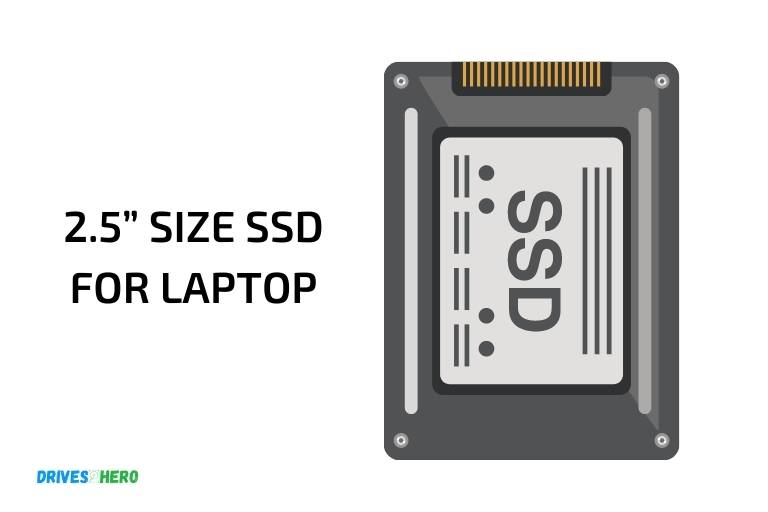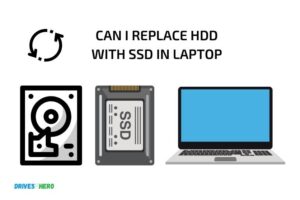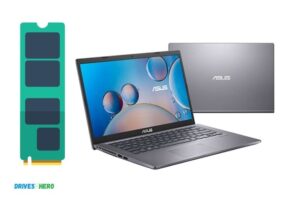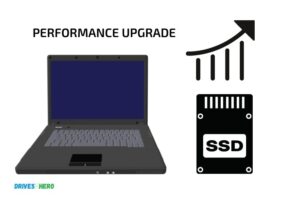What Size Ssd for Laptop? – Expert Guide
The ideal SSD size for a laptop depends on the user’s needs and budget, but a 256GB or 512GB SSD is recommended for most users.
When selecting an SSD size for your laptop, it’s essential to consider your storage needs, the type of tasks you perform, and your budget.
A larger SSD allows for faster performance, smoother multitasking, and more storage space for files and applications.
Factors to consider when choosing an SSD size include the operating system’s size, applications and files you plan to store, and your laptop’s upgradeability.
Ensure there is enough space for current needs and potential future requirements. For most users, a 256GB or 512GB SSD strikes an optimal balance between storage capacity and cost.
SSD Storage Options for Laptops
| SSD Size | Pros | Cons | Best For |
|---|---|---|---|
| 128 GB | Affordable, suitable for light users | Limited storage capacity, may fill up quickly | Browsing, documents, light usage |
| 256 GB | More storage capacity, reasonable price | May still fill up for heavy users | Light to moderate usage, some media storage |
| 512 GB | Ample storage for most users, faster speeds | More expensive | Moderate to heavy usage, gaming, photo & video editing |
| 1 TB | Large storage capacity, fast performance | Expensive, may not be needed for all users | Heavy usage, larger game libraries, extensive media storage |
| 2 TB+ | Massive storage, optimal for large files & apps | Very expensive, only necessary for specific needs | Professionals, extensive gaming, significant video editing & media storage |
Key Takeaway

5 Things to Consider When Choosing an SSD for Your Laptop
An Overview Of Ssds And Their Advantages
Solid state drives or ssds are becoming increasingly popular in laptops, replacing traditional hard drives. They offer faster performance, are more efficient, and offer more reliable storage.
We will provide an overview of ssds, how they differ from traditional hard drives, and the benefits of using ssds in laptops.
Definition Of Ssds
Ssds are storage devices that use nand-based flash memory to store data.
Unlike traditional hard drives, ssds have no moving parts, which means that they are much faster, more durable, and less prone to failure. Ssds are typically available in 2.
5-inch form factors, which are compatible with most laptops and desktops. They are also available in different capacities, ranging from 128gb to 4tb.
How Ssds Differ From Traditional Hard Drives
There are several key differences between ssds and traditional hard drives. Firstly, ssds have no moving parts, which makes them much faster than traditional hard drives.
They have a faster read/write speed, which means that data can be accessed and transferred more quickly.
Secondly, ssds are more efficient than traditional hard drives, as they consume less power, which in turn means longer battery life. Thirdly, ssds offer more reliable storage, as there are no moving parts that could fail.
Benefits Of Using Ssds In Laptops
Using an ssd in a laptop can bring several benefits:
- Improved performance: An ssd offers faster boot-up times, faster application loading times, and faster data transfer speeds.
- Longer battery life: Because ssds use less power, laptops using them have longer battery life.
- Increased durability: Ssds are more durable than hard drives, as there are no moving parts that could fail. This means that they are less likely to break if dropped or bumped.
- More reliable storage: With no moving parts, ssds are less prone to mechanical failure. This makes them a more reliable form of storage for laptops.
Ssds are quickly becoming the storage device of choice for laptops. By providing improved performance, longer battery life, and more reliable storage, they have several benefits that make them well worth considering.
How To Determine The Right Size Ssd For Your Laptop
When it comes to upgrading your laptop’s storage, an ssd is definitely the way to go. The performance boost an ssd provides is incomparable to traditional hard drives, making previously sluggish laptops feel brand new.
But, you might be wondering, what size ssd should you get for your laptop?
Here’s everything you need to know about determining the right size ssd for your laptop.
Factors To Consider When Selecting An Ssd
When choosing an ssd for your laptop, you’ll need to consider a few important factors:
- Budget: Ssd prices vary depending on the size and brand, so it’s essential to have a budget in mind before making a purchase.
- Speed: Look for ssds with faster read and write speeds to ensure optimal performance.
- Form factor: Make sure that the ssd you choose is the right form factor for your laptop.
- Brand: Go for well-known brands with a good track record for reliability.
Understanding The Terminology Used In Ssds
Before selecting an ssd, it’s helpful to understand the commonly used terminology:
- Sata: This is the most common interface for ssds and offers good performance for most laptops.
- Pcie: Pcie ssds are faster than sata ssds, making them ideal for gamers and those who require heavy usage.
- Nvme: This type of interface is a newer technology that allows for even faster speeds than pcie ssds.
Calculating The Storage Requirements For Your Laptop
To determine the right size ssd for your laptop, you need to calculate the storage requirements:
- Check how much space your current hard drive is using: This can be done by right-clicking on your c drive and selecting “properties.”
- Pick a new size that meets your needs: Ssds come in various sizes. Consider your budget, how much additional storage you’ll require, and if you have any current storage hogs like high-resolution games or files that require lots of space.
- Round up: If you’re between sizes, always go for the larger option. Not having enough storage can lead to headaches down the road.
It’s essential to examine factors such as budget, speed, form factor, and brand when selecting an ssd for your laptop.
With the right knowledge of terminology and calculations of storage requirements, you’ll be able to make a well-informed decision regarding what size ssd is right for your needs.
What Size Ssds Are Commonly Available For Laptops
Upgrading a laptop with an ssd can drastically improve its performance and increase its lifespan. However, deciding on the right ssd size can be a bit confusing.
Ssds come in different sizes, from 120 gb to 4 tb, making it challenging to decide which one to buy.
We will discuss the commonly available ssd sizes in the market, the benefits and limitations of different sizes, and which size is best suited for your laptop.
Overview Of Ssd Sizes Available In The Market
Ssds come in various sizes, including:
- 120 gb
- 240 gb
- 500 gb
- 1 tb
- 2 tb
- 4 tb
Ssds also come in different form factors. The most common form factor for laptops is the 2. 5-inch, whereas the m. 2 form factor is becoming increasingly popular.
Benefits And Limitations Of Different Sizes
Each ssd size has its own set of advantages and disadvantages.
Here is an overview of some of the most common ssd sizes and their benefits and limitations:
- 120 gb: This size is often the most affordable and can provide enough space for a few essential applications. However, 120 gb is not sufficient for those who need to store larger files, such as videos and photos.
- 240 gb: This size is a good option for those looking for a balance between price and performance. It can store more applications and files than 120 gb, but it may not be enough for those who need to store large files.
- 500 gb: This size is a popular choice as it can store a considerable number of applications, files, and media. However, it can be more expensive than smaller ssds.
- 1 tb: This size is ideal for those who require more storage space for media such as photos and videos. It is also ideal for gamers who require larger storage for their games. However, it can be more expensive, and its speed may not be as fast as smaller ssds.
- 2 tb and 4 tb: These sizes are ideal for media professionals who require a large amount of storage space. However, they can be costly, and not all laptops can support them due to size limitations.
Which Size Ssd Is Best For Your Laptop
Choosing the right ssd size for your laptop depends on your needs and budget.
Here are some scenarios to help guide you:
- If you run only a few applications and do not store many media files, a 120 gb ssd may be sufficient.
- If you store some media files along with several applications and games, a 240 gb or 500 gb ssd may be ideal.
- If you store a lot of media files and require significant storage for games and programs, consider a 1 tb ssd.
- Professionals who work with media files should consider 2 tb or 4 tb ssds.
When choosing an ssd for your laptop, consider your needs, budget, and laptop compatibility. With the right ssd size, you can significantly improve your laptop’s performance and increase its lifespan.
How To Install An Ssd In Your Laptop
Preparing Your Laptop For The Upgrade
Before installing an ssd in your laptop, it is important to prepare the laptop for the upgrade.
This involves backing up all important data, ensuring that your laptop is compatible with an ssd and obtaining all the necessary tools.
Here are the key points to consider when preparing your laptop:
- Backup all your important data to an external hard drive or cloud-based storage solution.
- Research the type of ssd your laptop requires and ensure that it is compatible.
- Gather all the necessary tools, including a screwdriver and the new ssd.
Steps To Replace The Old Hard Drive With An Ssd
Replacing your old hard drive with an ssd involves several steps, but the process is not complicated if you follow these key points.
Here are the steps to follow:
- Shut down your laptop and disconnect any power sources.
- Use your screwdriver to remove the screws holding the laptop case in place.
- Locate your hard drive and remove it from the laptop.
- Remove the bracket or caddy that holds the hard drive in place.
- Insert your new ssd into the bracket or caddy and secure it in place.
- Reconnect any cables that were attached to the old hard drive and return the bracket or caddy to its original position.
- Screw the laptop case back in place and reconnect the power source.
Best Practices For Installing And Configuring Your Ssd
Once you have installed your new ssd, it is important to ensure that it is configured correctly to optimize its performance and ensure that your laptop is running smoothly.
These are the key points that you should keep in mind when configuring your ssd:
- Install your operating system and any necessary drivers onto your ssd.
- Ensure that your ssd is properly aligned and formatted.
- Disable any unused services or features to conserve space and optimize performance.
- Use a reputable disk cloning software to transfer any remaining data from your old hard drive.
- Keep your ssd firmware up-to-date to ensure optimal performance.
By following these guidelines, you’ll be able to replace your old hard drive with an ssd and ensure that your laptop is running faster and smoother than ever before.
Frequently Asked Questions On What Size Ssd For Laptop
What Size Ssd Do I Need For My Laptop?
The size of ssd you need for your laptop depends on your storage space requirements.
Can I Upgrade My Laptop’S Ssd?
Most laptops have a replaceable ssd, so you can upgrade it to a larger one.
Is Ssd Better Than Hdd For Laptops?
Yes, ssd is faster and more reliable than hdd and provides better performance for laptops.
How Do I Know If My Laptop Supports Ssd?
Check your laptop’s specifications to see if it supports ssd. You can also check with the manufacturer.
Conclusion
After considering all the factors, we can confidently say that selecting the right ssd size for your laptop is crucial. It not only improves your system’s overall performance but also enhances your overall user experience.
Ssds with higher storage capacities are ideal for power users who require significant storage space, while smaller ssds are more economical and suitable for everyday users.
However, it is vital to consider your budget and usage requirements before making a final decision.
Additionally, taking into account the read and write speeds, the amount of storage space needed, and the purpose of use, you can make an informed decision about what size ssd to choose for your laptop.
So, go ahead and choose the right ssd size for your laptop to boost its performance significantly and enhance your everyday computing needs.






